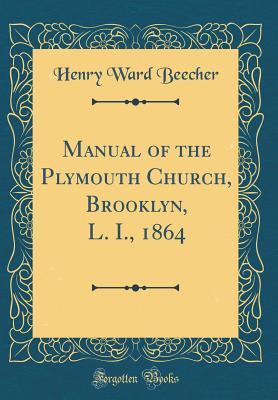- Bible
- Read the Bible
- Bible Versions
- Verse of the Day
- Reading Plans
- Verses by Topic
- Books of the Bible
- Bible Images
- Study
- Commentaries
- Concordances
- Dictionaries
- Encyclopedias
- Sermons
- Bible Atlas & Maps
- BP Wiki
- Devotionals
- Today's Devotionals
- Light of the World
- All Devotionals
- Inspirational Quotes
- More
- Picture Quotes
- Videos
- Inspirational
- Bible Study
- What The Bible Says
- Bible Q&As
- Daily Bread
- Bible by Genre
- Bible Stories
- Random Bible Verse
- Community
- Store
Manual of the Plymouth Church, Brooklyn, L. I., 1864 (Classic Reprint)
by Henry Ward Beecher
Excerpt from Manual of the Plymouth Church, Brooklyn, L. I., 1864
Sabbath-school Room and Study, was attached to the rear of the Church, fronting upon Orange Street, in 1831. The Pastors who lab01ed 011 this ground were Rev. Joseph Sanford, from to 1829; Rev. Daniel L. Ca1roll, D. D, fiom 1829 to 1835; Rev. Samuel H. Cox, D. D., from 1837 to 1817, when the l'1esbyterian Society built their present house of worship upon Henry Street, and the property was sold to John T. Howard, Henry C. Bowen, Seth B. Hunt (all of the Church of the Pilgrims), and David Hale, of' the Tabernacle Church, new-york. Mr. Howard conducted the negotiations, and the other gentlemen furnished the money. The purchase was made in J 11110, twenty thousand dollars, and possession was given May 16th, 1847. This property was conveyed to the Plymouth Church, by the above named gentlemen, for the actual cost and intciest, on the first 01 J unc, 184-8.
About the Publisher
Forgotten Books publishes hundreds of thousands of rare and classic books. Find more at www.forgottenbooks.comwww.forgottenbooks.com
This book is a reproduction of an important historical work. Forgotten Books uses state-of-the-art technology to digitally reconstruct the work, preserving the original format whilst repairing imperfections present in the aged copy. In rare cases, an imperfection in the original, such as a blemish or missing page, may be replicated in our edition. We do, however, repair the vast majority of imperfections successfully; any imperfections that remain are intentionally left to preserve the state of such historical works.
Sabbath-school Room and Study, was attached to the rear of the Church, fronting upon Orange Street, in 1831. The Pastors who lab01ed 011 this ground were Rev. Joseph Sanford, from to 1829; Rev. Daniel L. Ca1roll, D. D, fiom 1829 to 1835; Rev. Samuel H. Cox, D. D., from 1837 to 1817, when the l'1esbyterian Society built their present house of worship upon Henry Street, and the property was sold to John T. Howard, Henry C. Bowen, Seth B. Hunt (all of the Church of the Pilgrims), and David Hale, of' the Tabernacle Church, new-york. Mr. Howard conducted the negotiations, and the other gentlemen furnished the money. The purchase was made in J 11110, twenty thousand dollars, and possession was given May 16th, 1847. This property was conveyed to the Plymouth Church, by the above named gentlemen, for the actual cost and intciest, on the first 01 J unc, 184-8.
About the Publisher
Forgotten Books publishes hundreds of thousands of rare and classic books. Find more at www.forgottenbooks.comwww.forgottenbooks.com
This book is a reproduction of an important historical work. Forgotten Books uses state-of-the-art technology to digitally reconstruct the work, preserving the original format whilst repairing imperfections present in the aged copy. In rare cases, an imperfection in the original, such as a blemish or missing page, may be replicated in our edition. We do, however, repair the vast majority of imperfections successfully; any imperfections that remain are intentionally left to preserve the state of such historical works.
BUY NOW
Hardcover, 134 pages
Published January 7th 2019 by Forgotten Books (first published May 7th 2013)
© 2025 Bibleportal.com All rights reserved.

Henry Ward Beecher was an American preacher and reformer, born in Litchfield, Connecticut. He was the eighth child of Lyman and Roxana Foote Beecher, and brother of Harriet Beecher Stowe.
Reared in a Puritan atmosphere, he has graphically described the mystical experience which, coming to him in his early youth, changed his whole conception of theology and determined his choice of the ministry.
It was in the pulpit that Beecher was seen at his best. His mastery of the English tongue, his dramatic power, his instinctive art of impersonation, which had become a second nature, his vivid imagination, his breadth of intellectual view, his quaint humor alternating with genuine pathos, and above all his simple and singularly unaffected devotional nature, made him as a preacher without a peer in his own time and country.
He was stricken with apoplexy while still active in the ministry, and died at Brooklyn on the 8th of March 1887, in the seventy-fourth year of his age.
... Show more